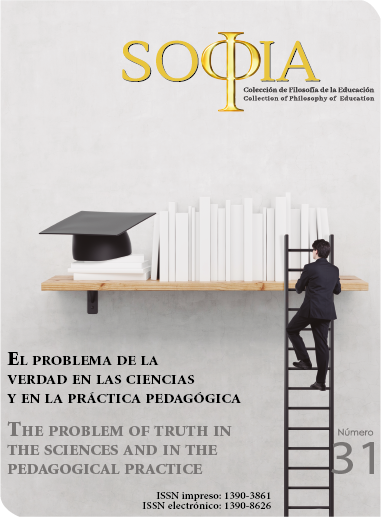Reflections about problem of truth, science and technology and its implications in the educational field
Main Article Content
Abstract
Article Details
Authorship: The list of authors signing must include only those people who have contributed intellectually to the development of the work. Collaboration in the collection of data is not, by itself, a sufficient criterion of authorship. "Sophia" declines any responsibility for possible conflicts arising from the authorship of the works that are published.
Copyright: The Salesian Polytechnic University preserves the copyrights of the published articles, and favors and allows their reuse under the Creative Commons Attribution-NonCommercial-ShareAlike 3.0 Ecuador license. They may be copied, used, disseminated, transmitted and publicly displayed, provided that: i) the authorship and the original source of their publication (journal, editorial and work URL) are cited; (Ii) are not used for commercial purposes; Iii) mention the existence and specifications of this license.
References
Artigas, M. (1999). Filosofía de la ciencia . Navarra: Eunsa.
Badiou, A. (1999). El ser y el acontecimeinto . Buenos Aires : Manantial.
Badiou, A. (2010). La filosofía, otra vez. España: Errata naturae.
Chalmers, A. (1990). ¿Qué es esa cosa llamada ciencia? Madrid : Siglo XXI .
Díaz, T. (2011). La función de las TIC en la transformación de la sociedad y de la educación. En R. Carneiro, J. Toscano , & T. Díaz, Los desafíos de las TIC para el cambio educativo (págs. 155-165). Madrid: Santillana.
Diéguez, A. (2014). La acción tecnológica desde la perspectiva orteguiana: el caso del transhumanismo. Estudios Orteguianos, 131-152.
Feenberg, A. (2000). La tecnología y el fin de la Historia. Oxford University Press.
Feenberg, A. (2005). Teoría crítica de la tecnología. Revista CTS, 109-123.
Ferrater, J. (2009). Diccionario de Filosofía. Barcelona: Ariel .
Gabriel, M. (2016). Por qué no existe el mundo . México : Oceano .
Gabriel, M. (2019). El sentido del pensamiento. Barcelona : Pasado Presente.
Gadamer, H.-G. (1977). Verdad y método . España: Sigueme.
Gimeno, J. (2012). Tecnología y educación ¿Qué hay de nuevo? En G. Hoyos, Filosofía de la educación (págs. 126-156). Madrid: Trotta .
Gómez, R. (2014). La dimensión valorativa de las ciencias . Buenos Aires : Universidad Nacional de Quilmes.
Heidegger, M. (1994). La pregunta por la técnica. En M. Heidegger, Conferencias y artículos (págs. 9-37). Barcelona: Serbal.
Heidegger, M. (2012). Ser y tiempo . Madrid : Trotta.
Kranzberg, M. (1986). Technology and History: "Kranzberg's Laws". Technology and Culture , 544-560.
Linares, J. (2003). La concepción heideggeriana de la técnica: destino y peligro para el ser del hombre. Signos filosóficos , 15-44.
Lozano, R. (2011). De las TIC a las TAC: tecnologías del aprendizaje y del conocimiento. Anuario ThinkEPI, 45-47.
Lyotard, J.-F. (1987). La condición postmoderna . Argentina: Catedra .
Martín, O. (2011). Educar en comunidad: promesas y realidades. En R. Carneiro , J. Toscano, & T. Díaz, Los desafíos de las TIC para el cambio educativo (págs. 79-94). Madrid: Santillana.
Medina, M. (1989). Prólogo. En C. Mitcham, ¿Qué es la filosofía de la tecnología? (págs. 9-11). País Vasco: Anthropos.
Meirieu, P. (2013). Recuperar la pedagogía. De lugares comunes a conceptos claves . Buenos Aires : Paidós .
Mejía, M. R. (2020). Educación, escuela y pedagogía en la cuarta revolución industrial desde nuestra América . Colombia: Desde abajo.
Ortega y Gasset, J. (1982). Meditación de la técnica y otros ensayos sobre ciencia y filosofía. Madrid : Alianza editorial .
Patricia , A. (2010). Heidegger y la pregunta por la técnica. Madrid : Edita.
Quintanilla, M. (2017). Tecnología: un enfoque filosófico y otros ensayos de filosofía de la tecnología. México: Fondo de Cultura Económica.
Sarsanedas, A. (2015). La filosofía de la tecnología. Barcelona: UOC.
Varela, J., & Alvarez , F. (1991). La arqueología de la escuela. Madrid: La Piqueta .
Wittgenstein, L. (2016). Tractatus lógico-philosophicus. España: Tecnos.
Zizek, S. (2006). Visión de paralaje. Buenos Aires: Fondo de Cultura Económica .

